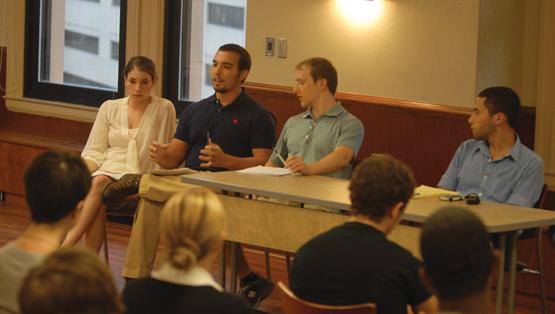During public debate, third-party clubs find common ground

September 4, 2013
While Marxists and Libertarians subscribe to radically different ideologies, they found one point they could all agree on Tuesday night when they met for a debate on Pitt’s campus.
“We agree that the two-party system has employed overseas unjust wars,” Antonio Diaz-Guy, a Libertarian and junior, said. “It has caused a lot of the economic turmoil that we see.”
On the left, the best the Marxists could say about either major party was that the Democrats represented the lesser of two evils.
“As a labor activist, I can tell you, we really have no say in the Democratic party,” Andrew Wagner said.
Members of the Pitt Students for Liberty and the Pittsburgh Student Marxist Association faced off in room 548 of the William Pitt Union on Tuesday from 7 to 8:30 p.m. Although they called the event a debate, the clubs agreed ahead of time that no winner would be declared. About 60 people attended the event.
The three Libertarians and two Marxists took their seats at the front of the room and described what each group considered to be the ideal economic system. They also discussed what role they think third parties can play in American politics.
Representatives for each club took their seats at the front of the room.
Pitt Students for Liberty president James McKibbin , a senior, represented the Libertarian position along with Diaz-Guy and senior club member Sam Beatty.
Andrew Wagner, a senior and the president of The Pittsburgh Marxist Student Association, and a graduate student, Chris Lemay, spoke for the Marxists.
Alongside their agreement to not declare a winner, both clubs also approved questions beforehand.
“Both of us reject the notion of Republicans and Democrats,” McKibbin said. “The whole idea is to put our Libertarian and Marxist ideas on the table in a legitimate fashion and then debate the merits of those. It’s not like we’re going for each other’s throats.”
Each party began by outlining its ideal economic system. The clubs also explained what role they thought third parties should play in American politics.
Libertarians said they believe in a free market. Marxists said the American economic system, which they called capitalist, is inherently flawed.
“Overall, I think there is room for a third party or several third parties,” Diaz-Guy said.
Campus leaders representing the two major political parties said they disagreed with the way Marxists and Libertarians characterized their positions.
“Republicans,especially College Republicans, embrace and welcome Libertarians, [as] they represent a pure philosophical form of capitalism and freedom that is the basis of the Republican platform,” College Republicans President Elizabeth Matenkoski said in an email.
Mike Waalkes, the president of Pitt College Democrats, disagreed with Wagner when The Pitt News contacted him following Tuesday night’s debate.
“I would disagree that labor activists are not a part of the Democratic Party,” he said. “They’re obviously a very important demographic.”
Neither Waalkes nor Matenkoski attended the debate, but both commented when The Pitt News contacted them afterward.
Even though neither the Marxists nor the Libertarians walked away with public office or a trophy, both groups were satisfied after the debate.
“We had a full house in there … It was pretty awesome, and it went a little later than we thought it would,” McKibbin said.
Wagner agreed, sayinghe was also satisfied.
“I think it went very well. I think both groups got a chance to put their ideas out there … I think my only big issue with what happened was that it was too short,” he said.


